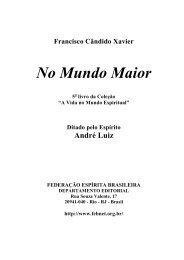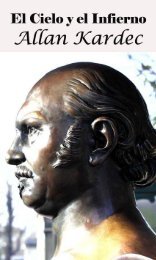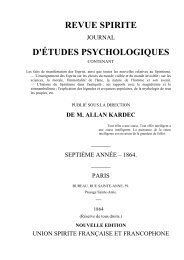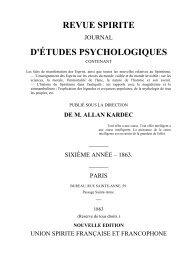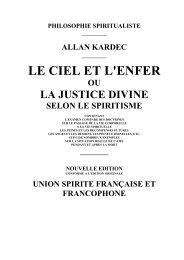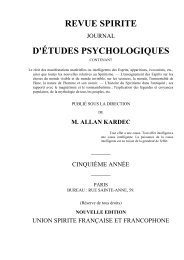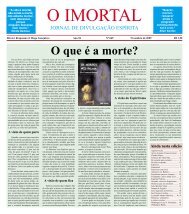PDF version - Geae
PDF version - Geae
PDF version - Geae
Create successful ePaper yourself
Turn your PDF publications into a flip-book with our unique Google optimized e-Paper software.
questioning of many people, they found some old peasants who had been told by their parents the history of a<br />
young beautiful woman who had thrown her husband into the sea. All the poor beggar woman had related was<br />
exactly verified. The Prince went to Hamburg and made inquiries of the Chief of Police regarding the beggar,<br />
and was told that she was uneducated, spoke only a dialect, and lived the life of a common mendicant.<br />
We have said that forgetfulness of past existences is one of the consequences of incarnation. However,<br />
this forgetfulness is not always absolute. With many people the past returns under the form of impressions<br />
without precise memories. These impressions often influence our actions, and they do not come from<br />
education, environment, or heredity. Among the number, we can class our own sudden antipathies and<br />
sympathies, our rapid intimacies and our innate ideas. We have only to look inward to study ourselves with<br />
attention to find in our tastes, tendencies, and traits of character numerous vestiges of the past, but<br />
unfortunately few of us give this personal examination with method and attention.<br />
There are always in every epoch of history a certain number of men who, thanks to exceptional<br />
dispositions and psychic organizations, conserve memories of their past lives. For them the plurality of<br />
existence is not a theory, it is a fact divinely perceived. The testimony of these men assumes considerable<br />
importance, because they usually occupy in the history of their time a high station, and almost all such men<br />
have superior minds, and exercise a great influence on their epochs. The rare faculty they enjoy is the result of<br />
an immense evolution. The value of a testimony being in exact rapport with the intelligence and integrity of<br />
the witness, we cannot pass in silence the affirmation of these men, some of whom have worn the crown of<br />
genius.<br />
Pythagoras recalled at least three of his existences and the names he bore in them. Empedocles<br />
declared that he recalled having been successively a boy and a girl. Lamartine in his Voyage in the Orient<br />
speaks of his distinct reminiscences of a far past. He says, ‘I had in Judea, no bible or chart at hand. There was<br />
none to give me the antique name of the valleys and mountains. Nevertheless, I at once recognized the Valley<br />
and the Battlefield of Saul! When we reached the convent, the Fathers confirmed with exactitude my<br />
previsions. My companions could not believe it, and it was the same at Sephora. I had designed with the finger<br />
and named a hill whereon the ruin of a château stood, as the probable birthplace of the Virgin. The next day, at<br />
the foot of an arid mountain, I recognised the tomb of the Maccabees. With the exception of the Valley of<br />
Lebanon, I saw scarcely any spot which was not for me like a memory. Have we then lived two lives, or a<br />
thousand? Is nor our memory but a tarnished image that the breath of God revives?’<br />
In the Literary Journal of November 1864, a writer on Joseph Mèry said: ‘He had singular theories<br />
which to him were convictions. He firmly believed he had lived several times and recalled the small incidents<br />
of anterior existences. He said Virgil and Horace had been friends of his, and he had known Augustus and<br />
Germanicus, and had fought in Gaul and Germany. He was a general, and commanded German troops. When<br />
they crossed the Rhine, he recognized places in the mountains where his name was then Minius, and he gives<br />
an incident to substantiate his idea. One day Mèry was visiting the Library of the Vatican in Rome; he was met<br />
by two young men in long brown robes, who spoke to him in pure Latin. Mèry was a Latin scholar, but he had<br />
never attempted to converse in the language of Juvenal. But as he listened to these young men, and admired<br />
their magnificent idiom, a veil seemed to fall from his eyes, and it seemed to him that it was thus he had<br />
conversed of old with his friends. Irreproachable phrases fell from his lips! Immediately he found elegant and<br />
correct expressions. He spoke in Latin as he spoke in French. This he could not have done without<br />
apprenticeship. He must have journeyed through a century of splendor to have acquired such language, which<br />
could not have been attained in an hour. Victor Hugo believed in a succession of lives; he believed he had<br />
been Juvenal in one incarnation. Amiel said, “It seems to me I have lived dozens or hundreds of lives. I have<br />
been a mathematician, a musician, a monk, a mother; I have been an animal, and a plant.”’<br />
To these reminiscences of illustrious men we must add that of a number of children. Here the<br />
phenomenon is easily explained. The adaptation of the psychic sense to the material organs at birth takes place<br />
slowly and gradually. It is complete at the seventh year usually: later sometimes. Up to this period the spirit of<br />
the child floats out of its envelope, and to a certain extent, sees its life in space. In this way we often gather<br />
from the lips of children allusions to anterior lives and descriptions of scenes and personages having no<br />
rapport with their actual young lives. These visions generally vanish at adult age, when the soul of the child<br />
enters into full possession of earthly organs. All the astral vibrations cease, the inner consciousness becomes<br />
mute. All the attention which these childish revelations merit is rarely accorded. On the contrary, parents are<br />
74



